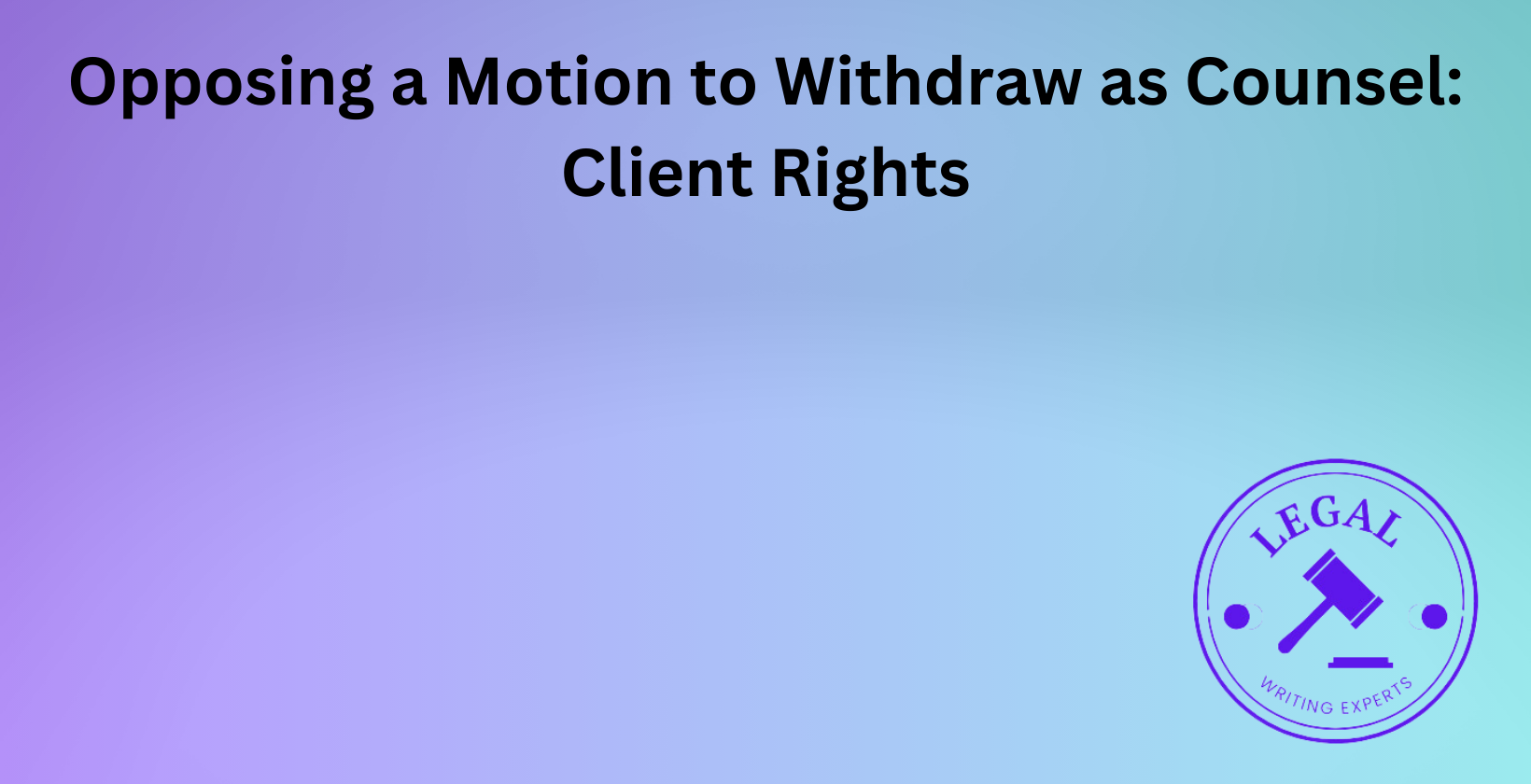Opposing a Motion to Withdraw as Counsel: Client Rights
Written by
Jessica E
February 21, 2025 · 8 min read

A motion to withdraw as counsel can significantly impact a client’s legal case. When an attorney seeks to withdraw, the client must understand their rights and legal options. The process requires careful consideration of the reasons for withdrawal, the client’s ability to oppose it, and the court’s evaluation of the request. Clients must take appropriate steps to protect their interests, whether by opposing the withdrawal or preparing for a new legal representative. Understanding the ethical obligations of attorneys and the potential outcomes of withdrawal helps clients navigate the legal system effectively.
What Is a Motion to Withdraw as Counsel?
A motion to withdraw as counsel is a formal request filed by an attorney seeking to terminate their legal representation of a client. This motion is submitted to the court and requires judicial approval before an attorney can be relieved of their duties. Courts may grant the motion if justified reasons exist, such as conflicts of interest, non-payment of fees, or a breakdown in communication between the attorney and client.
Why Might an Attorney File a Motion to Withdraw?
An attorney may file a motion to withdraw due to irreconcilable differences, non-payment of legal fees, conflicts of interest, or ethical concerns. Lawyers may also withdraw if a client engages in fraudulent or illegal activities, refuses to follow legal advice, or disrupts the attorney-client relationship. Courts review these reasons to determine whether withdrawal is appropriate and will not cause undue harm to the client’s case.
What Are a Client’s Rights When Their Attorney Seeks to Withdraw?
A client has the right to oppose a motion to withdraw and request that the court deny the attorney’s request. Clients also have the right to adequate notice of the withdrawal and an opportunity to find new legal representation. If an attorney withdraws, the client is entitled to receive their legal documents, case files, and any unearned fees. The court must ensure that the client’s legal rights are not compromised by the withdrawal.
How Can a Client Oppose a Motion to Withdraw as Counsel?
A client can oppose a motion to withdraw by filing a formal objection with the court. The objection should outline reasons why the withdrawal would negatively impact their case. Clients may argue that the attorney’s departure would cause undue hardship, delay proceedings, or leave them without adequate legal representation. Courts consider these factors when reviewing opposition to the motion.
What Are the Legal Grounds for Opposing an Attorney’s Withdrawal?
The legal grounds for opposing an attorney’s withdrawal include potential prejudice to the client, disruption of court proceedings, and failure of the attorney to provide sufficient justification. Clients can argue that the withdrawal would delay critical legal deadlines, violate procedural rules, or leave them without time to secure new counsel. Courts may deny withdrawal requests if they determine that it would unfairly disadvantage the client.
What Is the Process for Filing an Opposition to a Motion to Withdraw?
The process for filing an opposition to a motion to withdraw involves submitting a written objection to the court. This objection should include legal arguments supported by case law and relevant statutes. Clients must file their opposition within the deadline set by the court. After submission, a hearing may be scheduled where both parties present their arguments before the judge decides on the motion.
How Does a Court Evaluate a Client’s Opposition to Attorney Withdrawal?
A court evaluates a client’s opposition to attorney withdrawal by considering the reasons for withdrawal, potential harm to the client, and the impact on legal proceedings. Judges review whether the attorney’s departure would violate procedural rules, cause undue delays, or leave the client without reasonable legal options. Courts balance the attorney’s right to withdraw with the client’s need for fair representation.
What Are the Potential Outcomes if a Client Successfully Opposes the Withdrawal?
If a client successfully opposes the withdrawal, the court may order the attorney to continue representing them until new counsel is secured or the case is resolved. The attorney may be required to fulfill their legal obligations despite their desire to withdraw. In some cases, courts may impose conditions on withdrawal, such as requiring the attorney to remain available for specific legal matters before full withdrawal is granted.
What Steps Should a Client Take if the Court Grants the Attorney’s Withdrawal?
A client should immediately seek new legal representation if the court grants the attorney’s withdrawal. They should request their case files, review upcoming deadlines, and ensure that no critical legal matters are left unaddressed. Clients may consult legal document drafting services to prepare urgent filings while searching for a new attorney.
How Can a Client Find a New Attorney After Their Counsel Withdraws?
A client can find a new attorney by researching legal professionals specializing in their type of case. They can seek recommendations from legal associations, use online legal document review services, or consult freelance legal research companies to assess their legal needs. Hiring an attorney quickly is essential to avoid delays in their case.
What Are the Ethical Obligations of an Attorney When Withdrawing from Representation?
An attorney has ethical obligations to provide reasonable notice, transfer case files, and avoid prejudicing the client’s legal position when withdrawing from representation. Legal writing services help attorneys ensure that withdrawal motions comply with professional conduct rules. Attorneys must follow jurisdictional guidelines to avoid ethical violations.
How Can a Client Ensure Their Case Proceeds Smoothly After an Attorney’s Withdrawal?
A client can ensure their case proceeds smoothly by promptly securing new legal representation, staying informed about legal deadlines, and using legal document review services online. They may hire a legal writer to assist with drafting motions and filings while transitioning to a new attorney. Clients should remain proactive to prevent case delays and protect their legal rights.


